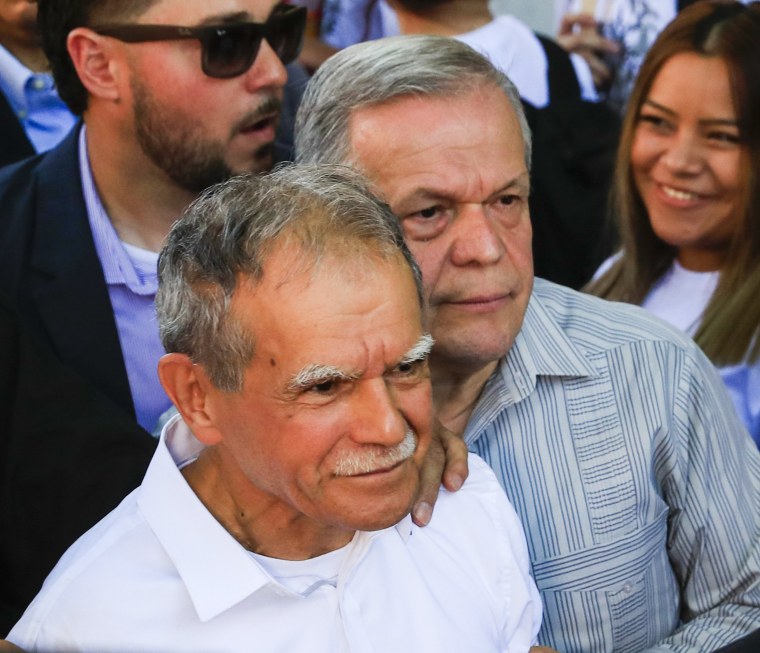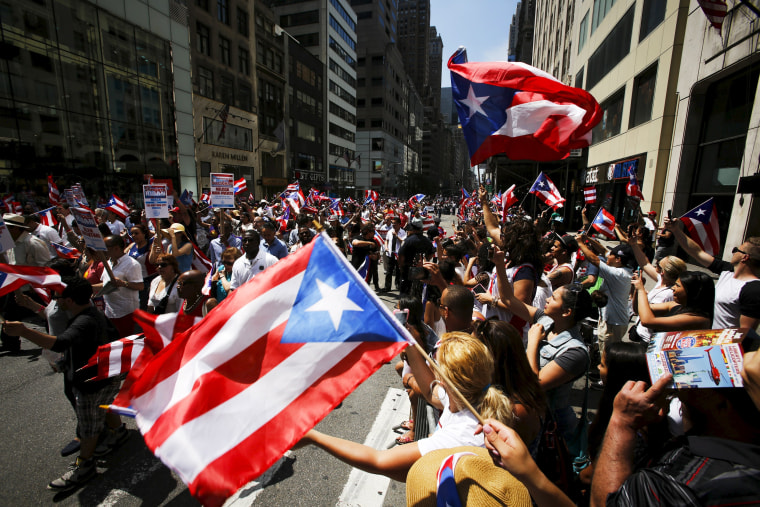Political forces are raining on an iconic parade. On June 11, the 60th annual National Puerto Rican Day Parade will take place on Manhattan’s Fifth Avenue. Unfortunately this year’s celebration of Puerto Rican heritage and culture was marred by parade organizers’ selection of Puerto Rican nationalist Oscar López Rivera as a special honoree. This generated negative press until Rivera announced Thursday that he would be attending the parade only as a ”humble Puerto Rican and grandfather.”
López Rivera’s decision comes too late to save what should be a festive event. Instead of bringing the Puerto Rican community together, this year’s parade has managed to divide it. The 2017 parade represents a missed opportunity by organizers to highlight the crises currently facing the island.
RELATED: Oscar López Rivera Steps Aside As Puerto Rican Day Parade Honoree
The National Puerto Rican Day Parade bills itself as “the largest demonstration of cultural pride in the nation.” Honoring the 3.5 million residents of Puerto Rico and the 5 million people of Puerto Rican descent on the U.S. mainland, the parade is a New York City institution.
This year, parade organizers made the ill-advised decision to honor Oscar López Rivera as a “National Freedom Hero” — the first time such a designation has been awarded — and to have him march at the front of the parade.

López Rivera, 74, served over 35 years in prison until his sentence was commuted by President Obama in January. Rivera was a member of FALN, a Spanish acronym for Armed Forces of National Liberation, a group that claimed responsibility for over 100 bombings in New York City, Chicago, and other cities in the 1970s and 1980s. One bombing at Manhattan’s Fraunces Tavern in 1975 killed four people and injured dozens. Although he was never directly charged in the FALN bombings, Rivera served time for sedition, interstate transportation of firearms, and conspiring to transport explosives with intent to destroy government property.
In releasing him early, Obama exercised his constitutional authority using his power of clemency. Clemency reduces a sentence. It is not a pardon. It does not reverse a conviction or imply innocence. Nor does clemency express presidential forgiveness for criminal acts.
López Rivera has been described as everything from a freedom fighter to a terrorist. Yet there is no dispute that he was an active member of a group that carried out violence as a means of furthering their cause.
In a statement defending their original decision to honor Rivera, parade organizers said that, “We aim to use Oscar López Rivera and his story – decades after – to bring a message for peace, unity, compassion and reflection.” The organizers cited the numerous public figures, including Pope Francis, Desmond Tutu, and President Bill Clinton, who sought Rivera’s clemency.
But there's a big leap between seeking clemency for a prisoner to installing a polarizing figure at the head of a parade with a specially created title.
Sponsors marched away from the parade — Goya Foods, which has sponsored the parade from the beginning, pulled out, calling it a business decision. They were followed by AT & T, Coca-Cola, JetBlue, New York Daily News, Univision, and the New York Yankees.
New York City Mayor Bill de Blasio, the City Council Speaker and a host of local politicians never wavered in their commitment to march in the parade behind Rivera. This is surprising, given that they represent the city that survived the worst terrorism attack on American soil in history — as well as tone deaf — given the recent bombing in Manchester.
Consider that the New York City Police Department Hispanic Society and the New York Fire Department Hispanic Society both declared their decision to boycott the parade this year. Or that the first New Yorker injured by an FALN bomb was a Puerto Rican police officer on his second day on the job in 1974; he lost sight in one eye.
That Rivera is a Bronze Star veteran who served most of his time does not erase his past ties to FALN. Nor should this controversy be linked to the ongoing question of Puerto Rico’s status. While independence for Puerto Rico is a legitimate movement (the island votes on its future on a non-binding referendum on the same day as the parade), advocating for independence is not synonymous with condoning violence.
In stepping down as an honoree, Rivera has done the right thing — yet the parade is a little over a week away. In whatever form it ultimately takes, the parade will be a dimmer version of its usual self.
The saddest thing about this controversy is that it has shifted attention away from Puerto Rico and its people at a time when they need it most. Puerto Ricans on the island are living through the fallout from a massive debt crisis, which includes cuts to health services, education, and public pensions. The parade could have served to raise awareness of the fact that those suffering on the island are our fellow citizens. Instead, it turned into a public spectacle of Latino infighting and disunity.
There are no winners in the debacle over the National Puerto Rican Day Parade. Organizers made a major misstep this year, and cynical lawmakers showed they were willing to blindly follow their lead. Oscar López Rivera was used for political purposes. And those who it will impact most are the thousands of New Yorkers and Puerto Ricans who enjoy the parade as a cherished tradition.

